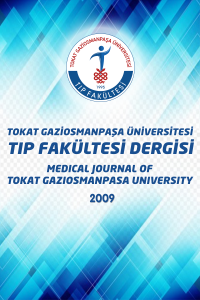İki Farklı Akrilik Esaslı Yumuşak Astar Maddesinin Zamana Bağlı Olarak
Yüzeylerinden İzole Edilen Candida albicans Hücrelerinde ALS1 Adezyon Geninin
Ekspresyonundaki Değişimin İncelenmesi
Amaç: Bu çalışmada; in vitro hızlandırılmış eskitme işlemi uygulanmış ve uygulanmamış iki farklı akrilik esaslı yumuşak astar maddesinin C. albicans hücreleri ile 12 ve 24 saat süreyle inkübasyonunun ardından, bu yumuşak astar maddelerinin yüzeylerinden izole edilen hücrelerdeki ALS1 geni mRNA ekspresyonunun kantitatif olarak araştırılması amaçlanmıştır. Gereç ve Yöntem: Çalışmada; oda sıcaklığında polimerize olan akril esaslı yumuşak astar maddesi olarak Visco Gel, ısıyla polimerize olan akril esaslı yumuşak astar maddesi olarak Vertex Soft kullanılmıştır. Her bir maddeden 40’ar adet olmak üzere toplam 80 adet örnek hazırlanmıştır. Her bir maddeden hazırlanan örneklerin 20 tanesine Atlas UV2000 Hızlandırılmış Hava Koşullandırma Test Cihazında hızlandırılmış eskitme işlemi uygulanmıştır. Ardından her bir yumuşak astar maddesinden hazırlanan eskitme işlemi uygulanan ve uygulanmayan 10’ar tane olmak üzere toplam 20 örnek 12 saat, diğer 20 tane örnek ise 24 saat süreyle C. albicans hücreleriyle inkübe edilmişlerdir. Örneklerin yüzeyinde oluşan biyofilm kütlesi kazınmış ve mRNA’ları izole edilmiştir. Bu mRNA’lar cDNA’ya çevrilmiş ve Real- time PZR ’de kantitatif analizleri yapılmıştır. Bulgular: In vitro hızlandırılmış eskitme işlemi uygulanmamış örneklerde ortalama gen ekspresyonları incelendiğinde Vertex Soft maddesinden hazırlanmış örneklerde Visco Gel maddesi örneklerine göre daha az gen ekspresyonu bulunmuştur. Örnek grupları arasında en az gen ekspresyonu, eskitme işlemi uygulanmamış ve 12 saat süreyle inkübe edilmiş Vertex Soft maddesi örneklerinde görülmüştür (16.00 ± 2.91 kopya/mL). Sonuç: Bu araştırma sonucunda yumuşak astar maddesi türünün, maddenin kullanım süresi ve C. albicans hücreleriyle inkübasyon sürelerinin ALS1 geni ekspresyonu üzerinde etkili olduğu görülmüştür.
The Evaluation of the Changes in ALS1 Adhesion Gene Levels in Candida albicans Cells Isolated From Two Different Acrylic Based Soft Lining Materials in Different Time Periods
Objective: The aim of this study was to investigate the quantitative expression of ALS1 gene mRNA isolated from the surface of the acrylic based soft lining materials, after the incubation with C. albicans cells for 12 and 24 hours of two different soft lining materials subjected to a process of in vitro accelerated aging and of the ones not subjected. Material and Method: In this study, Visco Gel (room temperature curing acrylic based soft lining material), Vertex Soft (heat-cured acrylic based soft lining material) were used . 40 specimens from each material were prepared so as to obtain totally 80 specimens. 20 specimens of each soft lining materials’ were subjected to accelerated aging process by using Conditioning Test Device and the other 20 were not subjected to aging process. 10 of the 20 specimens which were subjected to accelerated aging were incubated with C. albicans for 12 hours and the other 10 specimens were incubated with C. albicans for 24 hours. And 10 of the 20 specimens which were not subjected to accelerated aging were incubated with C. albicans for 12 hours and the other 10 specimens were incubated with C. albicans for 24 hours. The biofilm layer occured on the surfaces of the specimens were excavated and mRNAs were isolated. The mRNAs were converted into cDNA and quantitative analyses were performed with real-time PCR. Results: expression was analyzed in the samples, which was not applied to in vitro accelerated aging process, gene expression was less in the samples prepared under Vertex Soft material than the samples of Visco Gel material. The least gene expression between samples groups was seen in the samples of Vertex Soft material (16.00 ± 2.91 copy/mL), which was not applied accelareted aging process, and was incubated during 12 hoursConclusion:As a result of this study, we observed that the types of soft lining materials, duration of the material usage and the incubation period of C. albicans influenced the expression of ALS1 gene.
